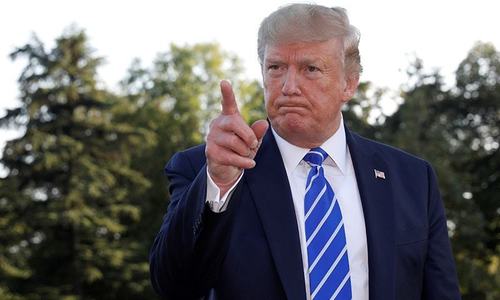NEW YORK: Prime Minister Imran Khan’s commitment to prevent cross-border terrorism, if implemented, would provide a strong basis for India-Pakistan dialogue, says a senior US official.
At a Friday afternoon news briefing in New York, Acting Assistant Secretary of State Alice G. Wells enunciated US President Donald Trump’s offers to mediate, saying it stems from his desire to reduce tensions between South Asia’s two nuclear neighbours.
“Prime Minister Khan has made important public commitments regarding the need to prevent cross-border terrorism and sanctuary for terrorist organisations, which, if implemented fully, would provide a strong basis for dialogue,” Ms Wells said in her opening statement.
In an apparent reference to reports that some protesters in AJK wanted to march up to the Line of Control (LoC) to show their rejection of India’s Aug 5 decision to annex occupied Kashmir, Ms Wells said: “We call on all parties to maintain peace and stability along the Line of Control.”
During this week’s 74th session of the UN General Assembly, US and other officials were heard expressing concerns over this report and some even pointed out that any attempt to cross the LoC in today’s tense situation could have dangerous consequences.
In her opening remarks, Ms Wells pointed out that President Trump had “made clear his concern over Indo-Pak tensions and his readiness to facilitate a dialogue if asked”.
Official says Washington will help Islamabad avoid being placed on FATF blacklist
Later, while answering a question about a possible US role in reducing tensions in South Asia, she noted that President Trump “speaks quite openly about his concerns over the level of tension between the two countries, particularly between two nuclear powers”.
The US president, she added, was also open about “his desire to see those tensions reduced; his willingness to play whatever positive role he can, including mediation if he were to be asked to do so”.
Mr Trump first expressed his desire to mediate during a White House meeting with PM Khan in July and since then he has repeatedly raised this issue in his remarks and in meeting with Mr Khan and his Indian counterpart Narendra Modi.
Even India’s continued rejection of these offers has discouraged him who mentioned his offers in his media briefings during the UNGA as well.
Ms Wells said the United States has already expressed its “continued concerns over the widespread detentions, including of local political and business leaders, and the restrictions on the residents of Jammu and Kashmir”.
Reminding the Indian government to remove those restrictions, she said: “We look forward to the Indian government’s resumption of political engagement with local leaders and the scheduling of promised elections at the earliest opportunity.”
Trade with US
Ms Wells said that in his meeting with Mr Khan on Monday, President Trump built on the conversations he started during the PM’s visit to the White House in July, including how to expand trade.
“We are going to host 15 separate Pakistani trade delegations over the next year in order to support trade and investment in energy, healthcare, agriculture, and franchising,” she added.
Ms Well said that President Trump also has appreciated Pakistan’s efforts to bring peace to Afghanistan, and the US wanted to help Pakistan meet the requirements of the Financial Action Task Force (FATF) to avoid being placed on its blacklist, which could unsettle the country’s economy.
“We look forward to the next FATF plenary meeting in October, where it’s important — and more important than ever — that Pakistan take the sustained and irreversible actions to achieve its policy goals on anti-money laundering and countering the financing of terrorism to satisfy fully its international commitments,” she said.
Ms Wells said that earlier this week, she spoke at the re-launching of the US-Pakistan Women’s Council, a public-private partnership that will leverage the power of US private sector to create opportunities for Pakistani women and girls.
“The event underscored for me the potential for our relationship to really be a force for good, but I think Pakistan’s actions in the coming weeks will be critical to determining the trajectory of our overall relationship,” she said.
Asked if the US was doing enough to reduce tensions between India and Pakistan, she said Washington was “always actively promoting regional stability, and certainly one of the first strategies that was put forward by this administration was the South Asia strategy”.
This was a strategy not just to stabilise Afghanistan as peace in Afghanistan “requires the full support of the regional countries and regional powers”.
She pointed out that President Trump has been deeply engaged with his counterparts from India and Pakistani in meetings and in phone conversations.
“I think it’s evident the president has a very good rapport with both leaders, and the conversations that we have on some of the challenging issues that have been at the heart of the conflict over many decades — we engage in those issues intensively,” she said.
Ms Wells noted that while the disagreement was continuing between India and Pakistan, “our ability to engage with the leaders and our willingness to engage with the leaders and their receptivity to our engagement is positive”.
The US official noted that Indian and Pakistani leaders had quite publicly framed their disagreements with one another during the UNGA.
“What we have to focus on is like can we achieve confidence that non-terrorist or non-state actors are no longer afforded sanctuary and able to operate in the region, can we achieve confidence that both sides are committed to a constructive dialogue,” she said.
“And when the confidence emerges, I think then the (India, Pakistan) dialogue will follow. We will do whatever we can to try to help promote greater confidence between the countries, but practical steps have to be taken.”
Published in Dawn, September 29th, 2019














































